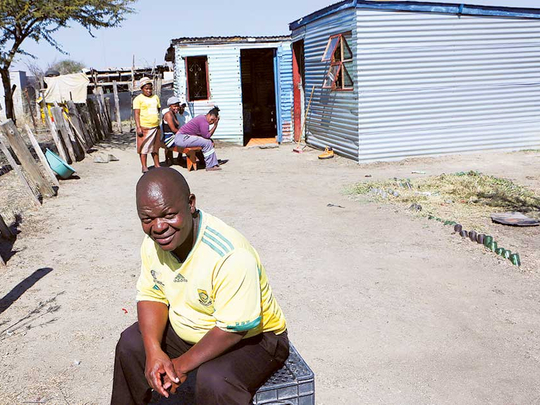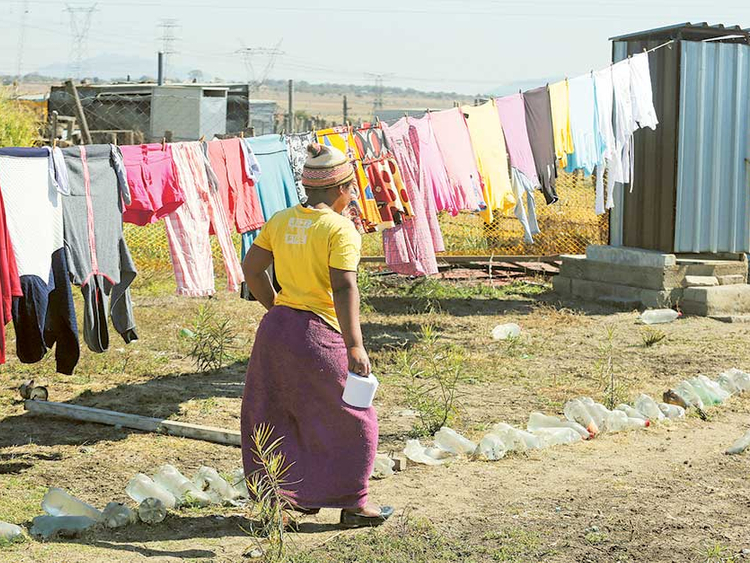
Marikana, South Africa: Mine worker Mziseni Zotyatha lives in a neat, one-room metal shack with plastic sheeting stretched above his bed to keep out the rain. He must go elsewhere for running water and a toilet.
“I can’t come here with my wife and children and expect them to live with me like this,” says Zotyatha, 34, a father of three who works at the Marikana platinum mine owned by the British firm Lonmin. “I work hard. I deserve to stay in a better place.”
Four years after South African police shot dead 34 striking Marikana miners driven to fury by poor wages and living conditions, Lonmin has failed to provide the homes it promised for several thousand workers, says Amnesty International in a report published on Monday.
Instead, Lonmin has built just three houses, says Amnesty.
About 13,500 employees “are still in need of formal accommodation,” Lonmin confirmed in an August 1 letter to the rights group.
Squalid housing settlements without sewer systems or other basic services are a problem for mine workers across South Africa, whose economy was built on the mining industry and its black, often migrant, labour.
That such poor living conditions remain at the scene of the country’s deadliest strike in decades spotlights how little has improved since the 1994 end of apartheid, the system of racial discrimination.
Lonmin is in breach of its legal agreement with the South African government to improve housing at the mine, says the Amnesty report which asks why the government hasn’t enforced the deal or revoked Lonmin’s mining license.
“The challenges are huge,” a Lonmin spokeswoman, Sue Vey, said in an email to The Associated Press. “This is not an undertaking that any mining company can do successfully on its own.”
A small white cross on a rocky hill marks the site where the striking Marikana miners were killed on August 16, 2012. At a dusty bus stop nearby, campaign posters from recent municipal elections are starting to fade. “Spacious Homes,” one promises.
The miners walk daily between the platinum mine, ringed by razor wire, and their tiny houses pieced together from corrugated metal.
For decades, workers once lived in crowded, same-sex hostels that produced some of the most determined opposition to apartheid. Lonmin houses about 3,000 workers in renovated hostels, according to Amnesty. But that still leaves thousands of workers without adequate housing.
Some Marikana workers got tired of waiting for new homes and built their own.
The two-room metal shack of Ntutuzelo Vukani, 44, is held together with nails hammered through rusting bottle caps. The roof leaks. There’s an outdoor tap, a pit latrine toilet and electricity from an impromptu connection. Five people live there.
Hundreds of homes in the community, connected by dirt paths, are in similar shape.
“We were promised homes, but things are still the same,” said Vukani in his native Xhosa language. He said he came to Marikana to escape poverty but did not succeed. He wants a brick house with an indoor toilet and electricity, so he can live a “soft” life.
A government-appointed commission of inquiry that investigated the Marikana shootings found that Lonmin had contributed to the labour unrest by not addressing the housing shortage.
Amnesty International says the problem remains acute. It says Lonmin promised in 2006 to build 5,500 houses for workers but never did, building only three for show. South Africa’s Department of Mineral Resources, which oversees such agreements, did not respond to a request for comment to Amnesty’s findings.
“The catastrophic events of August 2012 should have been a decisive wake-up call to Lonmin that it must address these truly appalling living conditions,” said Deprose Muchena, Amnesty’s southern Africa regional director. “The company’s failure to improve employees’ housing is baffling and irresponsible in the extreme.”













